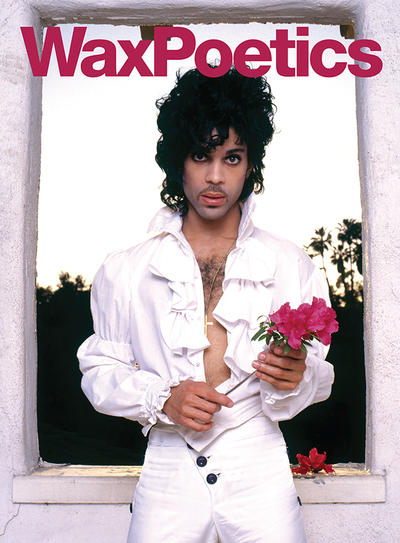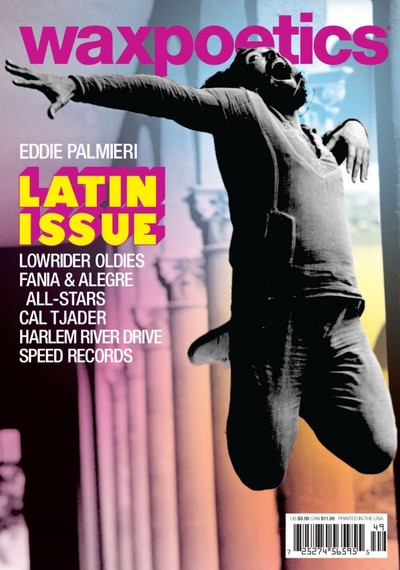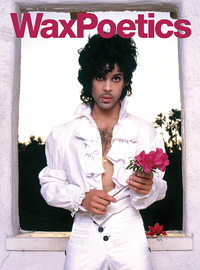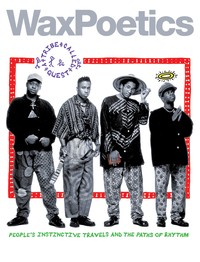Wax Poetics i — #49

Wax Poetics
Wax Poetics is a quarterly American music magazine dedicated to vintage and contemporary jazz, funk, soul, Latin, hip-hop, reggae, blues, and R&B in the crate-digger tradition; the name of the magazine is itself an allusion to vinyl records.
- 33 (16)
- United States
- Four issues a year
- Music
- First issue 2001
- ISSN 1537-8241
USD 9.99
Eddie Palmieri / Lowrider Oldies / Fania & Alegre All-Stars / Cal Tjader / Harlem River Drive / Speed Records
Afro-Cuban Evolution Pianist Eddie Palmieri is a true Latin music visionary. His complex rhythmic compositions and daring improvisation put him at the forefront of musical icons who challenged conventional limitations. Though steeped in the Afro-Cuban tradition, Palmieri has always pushed the boundaries and in the process reinvented the sound of the Latin dance band.
Bittersweet Harmony From the late 1950s to present day, doo-wop and sweet soul has been the unofficial soundtrack of the Chicano experience. Coming out of a landscape of racial inequality, Chicano lowriders found that these sentimental R&B ballads spoke volumes. Playing a crucial role in Art Laboe’s “Oldies But Goodies” radio broadcasts, California Chicanos loyally dedicated songs through the bad and the good—breakups and weddings, prison bids and coming-out parties, funerals and celebrations. Staying close to their roots, Chicanos have kept the tradition of Lowrider Oldies alive, breeding heavyweights in the record-collecting scene in the process.
Grand Slam With the help of the Cuban descarga tradition, Al Santiago sparked a Latin music phenomenon. Creating the Alegre All-Stars in 1961 on his tiny Bronx label, Alegre Records, Santiago would influence other record men to step up to the plate, following his game plan. Ultimately, the greatest salsa band of all time, the Fania All-Stars, took the all-star tradition to the big leagues. From tiny clubs to Yankee Stadium, this dream team of clutch players hit it out of the park, cut after cut.
Buenas Vibraciones Vibraphonist Cal Tjader was one of the first American jazz musicians to embrace Latin music. He played with notable percussionists Armando Peraza, Willie Bobo, and Mongo Santamaria early in his development. He covered Dizzy Gillespie and Chano Pozo’s famed “Guarachi Guaro” in 1955 and made it his own in 1965 as “Soul Sauce.” Throughout his career, Cal Tjader would coat that salsa on everything he played.
Righteous Struggle New York’s Harlem River Drive is a dividing line, a highway where the rich zip past the poor, says singer Jimmy Norman. Eddie Palmieri’s Latin-funk band of the same name tackled these hard truths, playing prisons and speaking to the common man. But the album failed to achieve the crossover financial success he had hoped for. Ultimately, Norman and Palmieri made a powerful socio-political statement that continues to resonate to this day.
Fast Life Banking on the boogaloo craze that was exploding in New York City in the late 1960s, Stan Lewis left the flourishing Latin label Cotique to form his own holding, Speed Records. With the help of veteran record man Morty Craft and hip Nuyorican songwriter/producer Bobby Marin, Speed quickly formed a roster of new blood that played to young NY Latinos’ boogaloo and salsa sensibilities. From psychedelic novelty records to authentic, streetwise Latin soul, Speed took risks and aimed high but failed to find a hit and in a flash faded away into obscurity and, ultimately, legend.
Helado Negro escapes the city and crafts synth-heavy ode
Bio Ritmo continue to evolve salsa dura in spite of their unlikely locale
Re:Discovery Joe Arroyo
What do you think of this issue?
Sign up or Log in to join the discussion.




